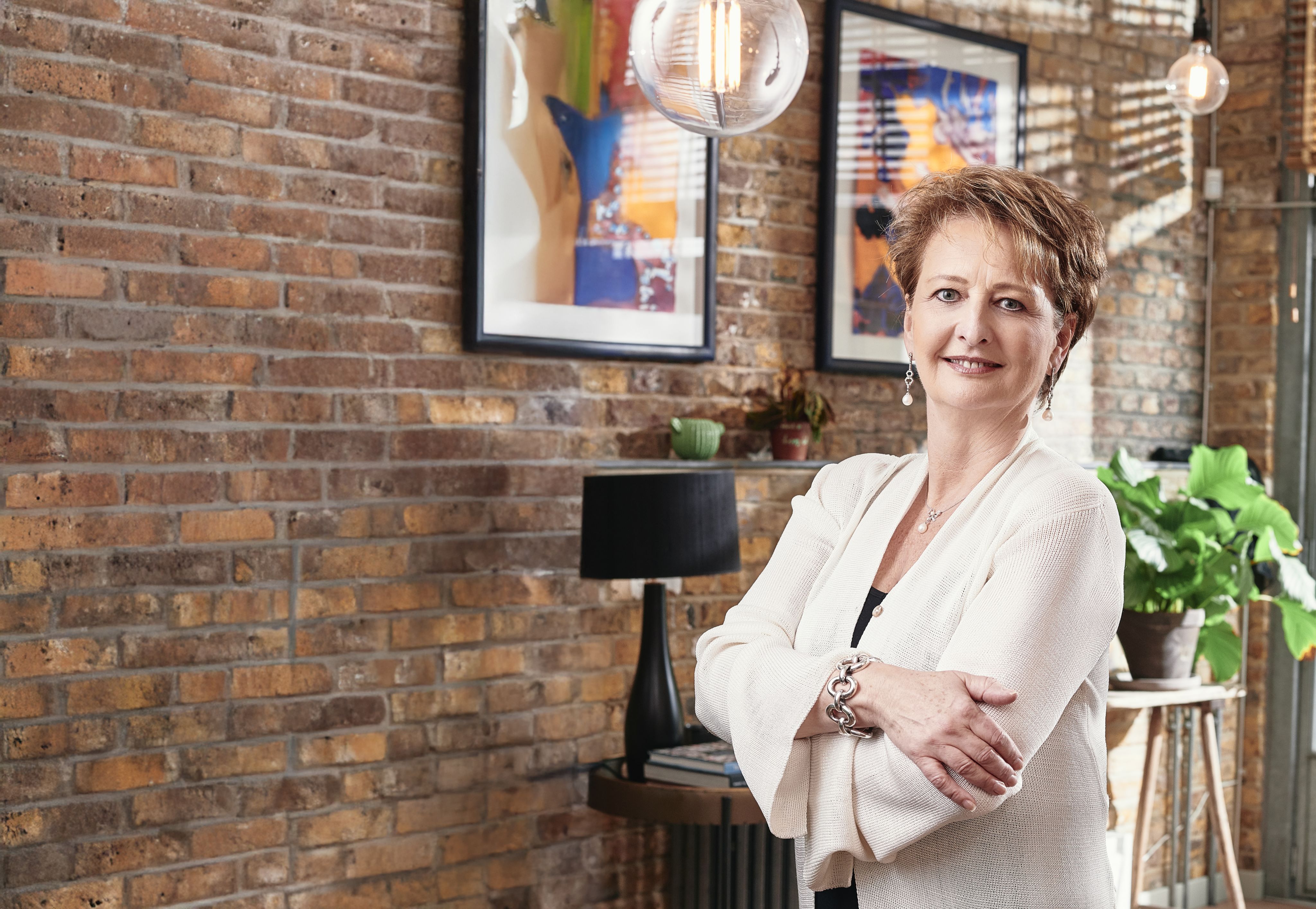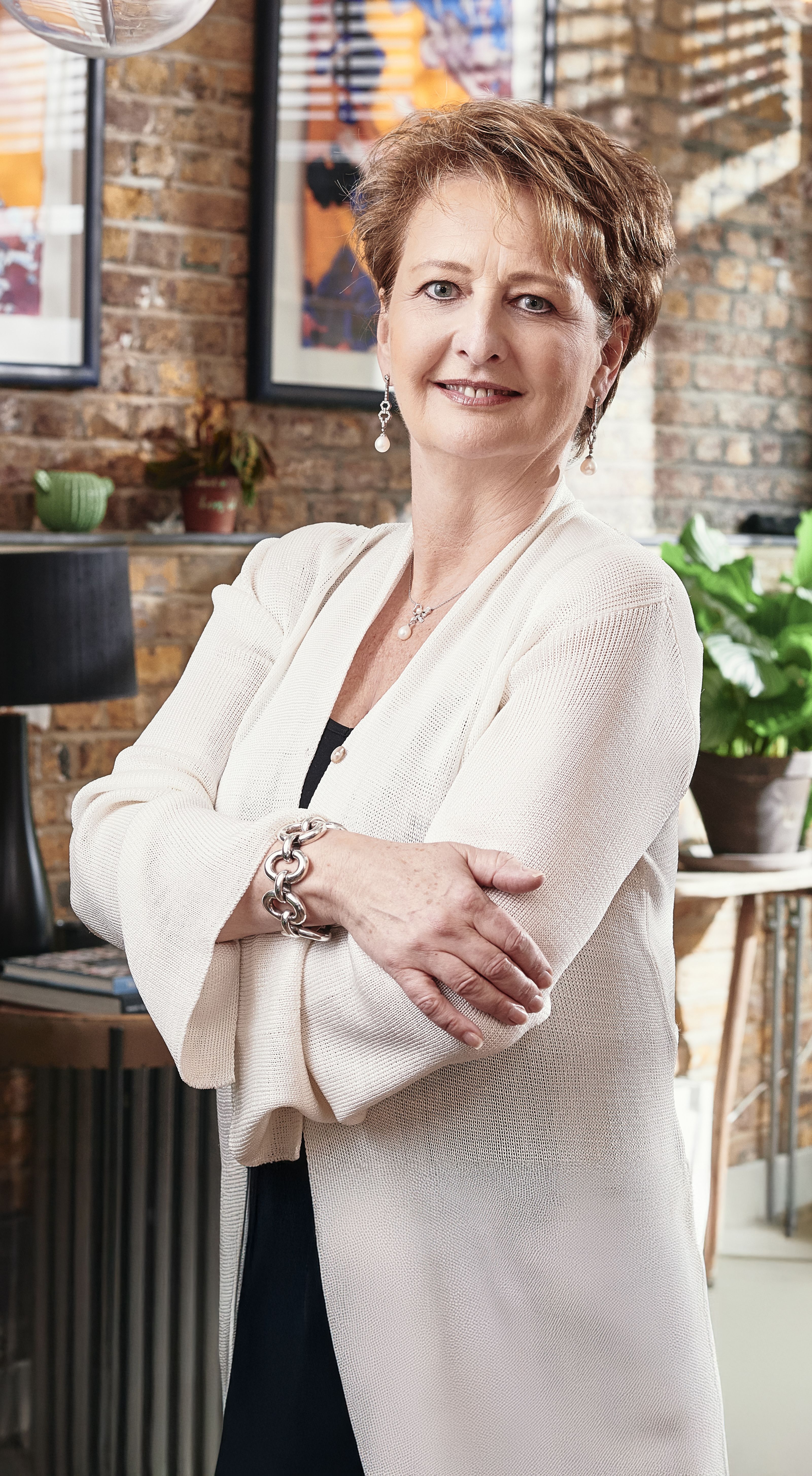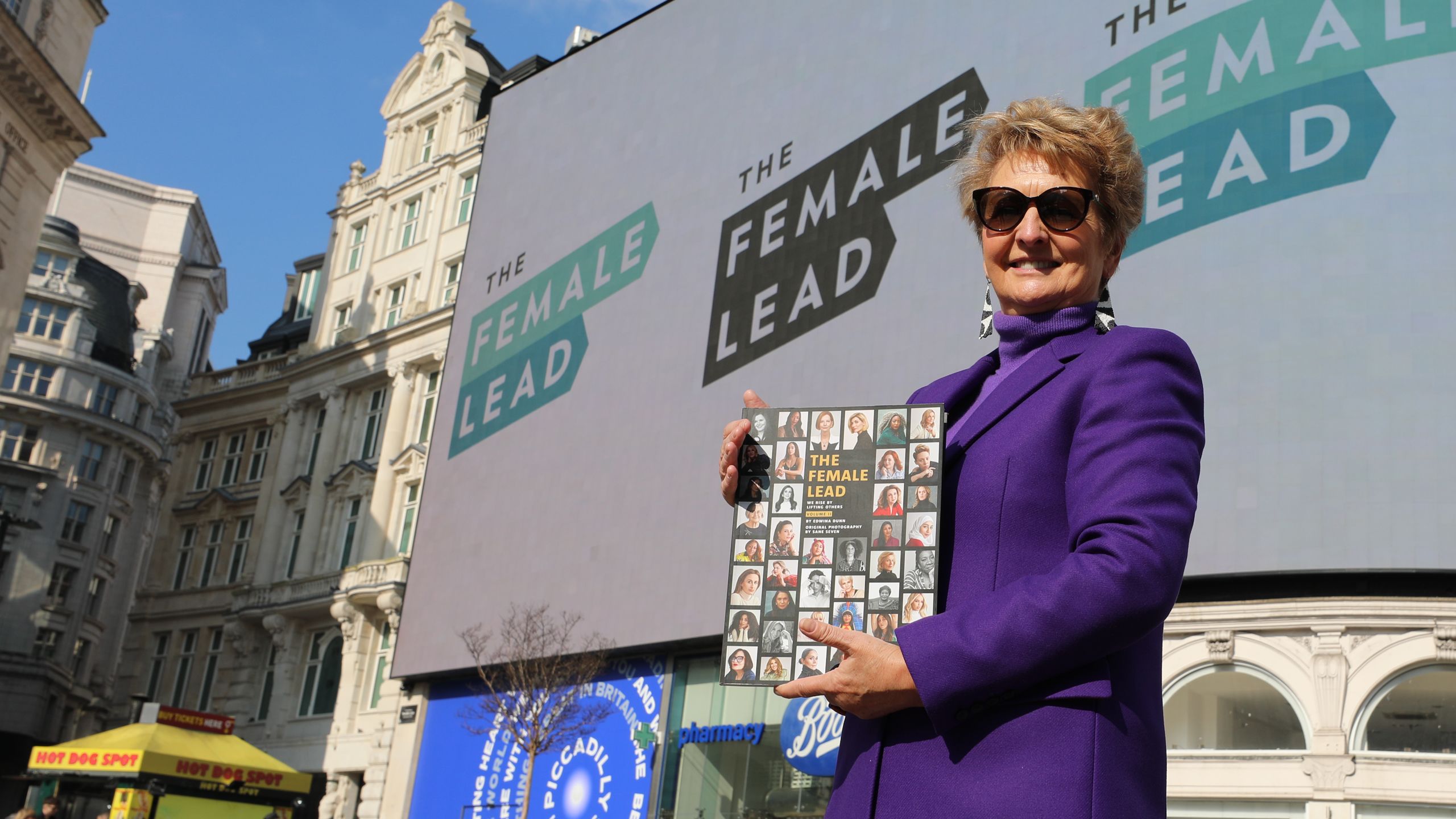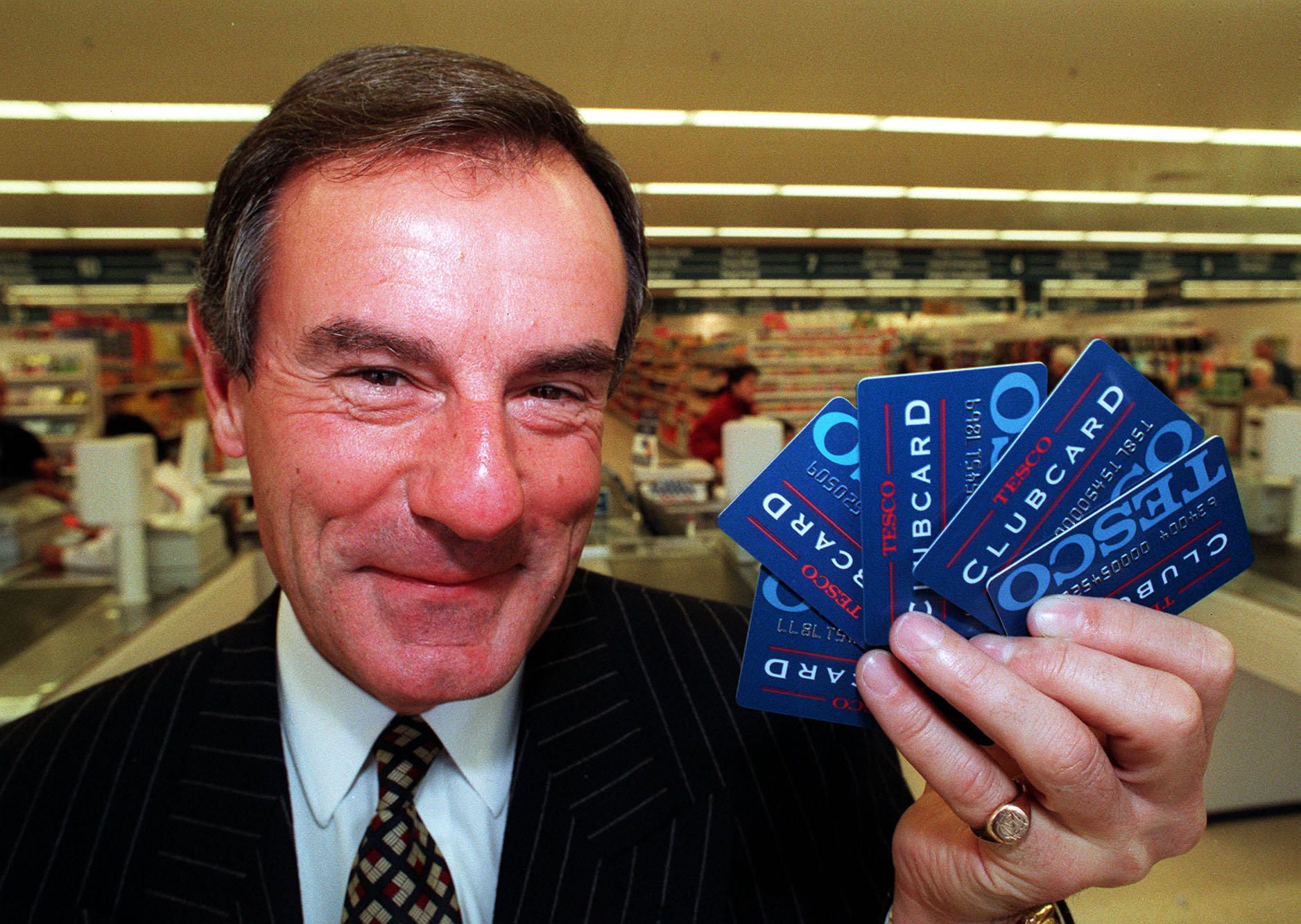

As CEO of Dunnhumby and creator of Tesco Clubcard, Edwina Dunn OBE blazed a trail through tech and business. As her charity, the Female Lead, celebrates its first decade, she tells Lysanne Currie why women hold the key to economic success
“I couldn’t figure out why school kept talking to us about old, dead women,” says Edwina Dunn. “The only role models I had were Florence Nightingale and Marie Curie, and it just seemed ridiculous that we had to reach so far back.”
This was the formative moment that would culminate decades later in her creation of the Female Lead, Edwina Dunn’s educational charity dedicated to increasing the visibility of women’s success stories in all walks of life, offering girls a wider selection of role models than those represented in popular culture. But her work didn’t stop there: Dunn has also become a vocal advocate for the economic power of women, pushing businesses to understand and tap into this vast, underutilised potential.
Dunn spent her early childhood in Brazil – “very exotic and exciting, it gave me a little more glamour than I would have had otherwise” – before moving back to the UK as a teenager and settling in leafy Surrey. “I lived in a really lovely place but there wasn’t much to do,” she recalls. “If you wanted to go anywhere, you had to get on a bus or a train. It gave me time to dream (I don’t think people give themselves that time anymore) and the stark realisation that if I wanted to go anywhere, I needed to make some money.”
And so, Dunn’s entrepreneurial career began: babysitting and DJing (“I would just go to a party, stay sober and play my favourite records”). After graduating from Bournemouth University with a degree in geography in 1979, her first job was with CACI, an American software consultancy, where she worked on analysing census data and automating the analysis. Over a decade with the firm she rose from Marketing Assistant to Vice President.
Join our club
In 1989, after leaving CACI, Dunn co-founded Dunnhumby, a global consumer insights company, with her husband and long-term business partner, Clive Humby. And in 1994, Tesco came knocking. The supermarket giant had a daunting challenge for them: harnessing vast amounts of customer data to develop a loyalty card.
Dunn and Humby took the same principles of data analysis they’d used in their previous roles and applied them to the vast amounts of consumer data available to Tesco. They used just 10% of the data to achieve 95–99% accuracy – a method that far outperformed traditional marketing approaches.
Tesco Chairman Sir Ian MacLaurin launches the Clubcard at its Southwark store in 1995
Tesco Chairman Sir Ian MacLaurin launches the Clubcard at its Southwark store in 1995
The result was the revolutionary Tesco Clubcard. Initially trialled in a handful of stores, and launched nationwide within a year, it utterly transformed Tesco’s market position, leading to innovations such as Tesco Finest, Tesco Bank and Tesco Mobile. As Dunn explains: “It became the foundation for so many decisions, steering Tesco like an airplane dashboard.” The Clubcard not only helped Tesco become the UK’s largest supermarket, it also sparked a global transformation in the way businesses use data to understand their customers.
With Tesco’s blessing, Dunnhumby quickly expanded, securing similar partnerships with supermarket groups around the world. In 2002, Tesco acquired a 53% stake in the company, and by 2010, the couple had sold their remaining shares to the supermarket giant, earning them a reported £93m in total.
“35% of women globally say they don’t think that having a career and a baby is sustainable. That’s huge. We have to resolve this”
Dunn and Humby next turned their attention to the vast, untapped potential of social media data. As Dunn recalls: “None of us thought it would be as insightful or important to people as it’s become today.”
Through this data, they could see patterns in people’s passions, revealing that, for example, “people in Wales love singing, people in Leeds love rugby league, and people on the coast love windsurfing”. By breaking this data right down to postcode level, they could predict future behaviour with remarkable accuracy. “You can find patterns to help brands be more relevant, understand communities, and decide where they need to be in the country or globally, because this data is global,” she says.
Role models
After selling Dunnhumby, Dunn felt an overwhelming desire to create a social impact. “I’d been really lucky,” she says. “And I know that’s something women often say, instead of saying they worked hard, but I did feel lucky and I really wanted to give something back, so I founded the Female Lead.”
The goal was simple yet profound: to show young girls that role models are all around them.
Dunn and her team created films, portraits and a book that was gifted to 25,000 schools in the UK and abroad. But as it turned out, her work was only just beginning. “So many women were saying, ‘We’re not seen or heard either. There’s nothing for us in the workplace. We don’t see success,’” Dunn recalls.
“One of my overriding characteristics is that I feel responsible for everything. Suddenly I felt responsible for the fact that they weren’t seen or heard. And I realised the job was so much bigger.” Soon, the Female Lead was expanded to address the visibility of women in all areas of life, championing their stories and creating resources to empower them globally.
As CEO of Dunnhumby and creator of Tesco Clubcard, Edwina Dunn OBE blazed a trail through tech and business. As her charity, the Female Lead, celebrates its first decade, she tells Lysanne Currie why women hold the key to economic success
“I couldn’t figure out why school kept talking to us about old, dead women,” says Edwina Dunn. “The only role models I had were Florence Nightingale and Marie Curie, and it just seemed ridiculous that we had to reach so far back.”
This was the formative moment that would culminate decades later in her creation of the Female Lead, Edwina Dunn’s educational charity dedicated to increasing the visibility of women’s success stories in all walks of life, offering girls a wider selection of role models than those represented in popular culture. But her work didn’t stop there: Dunn has also become a vocal advocate for the economic power of women, pushing businesses to understand and tap into this vast, underutilised potential.
Dunn spent her early childhood in Brazil – “very exotic and exciting, it gave me a little more glamour than I would have had otherwise” – before moving back to the UK as a teenager and settling in leafy Surrey. “I lived in a really lovely place but there wasn’t much to do,” she recalls. “If you wanted to go anywhere, you had to get on a bus or a train. It gave me time to dream (I don’t think people give themselves that time anymore) and the stark realisation that if I wanted to go anywhere, I needed to make some money.”
And so, Dunn’s entrepreneurial career began: babysitting and DJing (“I would just go to a party, stay sober and play my favourite records”). After graduating from Bournemouth University with a degree in geography in 1979, her first job was with CACI, an American software consultancy, where she worked on analysing census data and automating the analysis. Over a decade with the firm she rose from Marketing Assistant to Vice President.
Join our club
In 1989, after leaving CACI, Dunn co-founded Dunnhumby, a global consumer insights company, with her husband and long-term business partner, Clive Humby. And in 1994, Tesco came knocking. The supermarket giant had a daunting challenge for them: harnessing vast amounts of customer data to develop a loyalty card.
Dunn and Humby took the same principles of data analysis they’d used in their previous roles and applied them to the vast amounts of consumer data available to Tesco. They used just 10% of the data to achieve 95–99% accuracy – a method that far outperformed traditional marketing approaches.
Tesco Chairman Sir Ian MacLaurin launches the Clubcard at its Southwark store in 1995
Tesco Chairman Sir Ian MacLaurin launches the Clubcard at its Southwark store in 1995
The result was the revolutionary Tesco Clubcard. Initially trialled in a handful of stores, and launched nationwide within a year, it utterly transformed Tesco’s market position, leading to innovations such as Tesco Finest, Tesco Bank and Tesco Mobile. As Dunn explains, “It became the foundation for so many decisions, steering Tesco like an airplane dashboard.” The Clubcard not only helped Tesco become the UK’s largest supermarket, it also sparked a global transformation in the way businesses use data to understand their customers.
With Tesco’s blessing, Dunnhumby quickly expanded, securing similar partnerships with supermarket groups around the world. In 2002, Tesco acquired a 53% stake in the company, and by 2010, the couple had sold their remaining shares to the supermarket giant, earning them a reported £93m.
“35% of women globally say they don’t think that having a career and a baby is sustainable. That’s huge. We have to resolve this”
Dunn and Humby next turned their attention to the vast, untapped potential of social media data. As Dunn recalls, “None of us thought it would be as insightful or important to people as it’s become today.”
Through this data, they could see patterns in people’s passions, revealing that, for example, “people in Wales love singing, people in Leeds love rugby league, and people on the coast love windsurfing”. By breaking this data right down to postcode level, they could predict future behaviour with remarkable accuracy. “You can find patterns to help brands be more relevant, understand communities, and decide where they need to be in the country or globally, because this data is global,” she says.
Role models
After selling Dunnhumby, Dunn felt an overwhelming desire to create a social impact. “I’d been really lucky,” she says. “And I know that’s something women often say, instead of saying they worked hard, but I did feel lucky and I really wanted to give something back, so I founded the Female Lead.”
The goal was simple yet profound: to show young girls that role models are all around them.
Dunn and her team created films, portraits and a book that was gifted to 25,000 schools in the UK and abroad. But as it turned out, her work was only just beginning. “So many women were saying, ‘We’re not seen or heard either. There’s nothing for us in the workplace. We don’t see success,’” Dunn recalls.
“One of my overriding characteristics is that I feel responsible for everything. Suddenly I felt responsible for the fact that they weren’t seen or heard. And I realised the job was so much bigger.” Soon, the Female Lead was expanded to address the visibility of women in all areas of life, championing their stories and creating resources to empower them globally.
Education
Studied geography at Bournemouth University
1989
Founds Dunnhumby
2012
Joins Starcount as Chair
2013
Appointed to board of the Science Museum Group
2014
Made NED of HMRC
2015
Launches the Female Lead charity
2018
Becomes Director for Centre for Data Ethics and Innovation
2019
Appointed Commissioner of Geospatial Commission; awarded an OBE for services to data and business

Dunn believes women have three major roles in society. The first is as unpaid or low-paid carers. The second is as colleagues in the workplace. Noting that four out of five women will have children, often later in life, she emphasises the need for workplaces to better support women returning from maternity leave, who typically face a lack of reinduction or unfair assessments that label high performers as “average” after time away.
“With women comprising nearly 50% of employees, we need to work out how to keep them in the workplace. At the Female Lead, we recently surveyed 8,000 women globally – and 35% of them said they don’t think that having a career and a baby is sustainable. That’s huge. We have to resolve this. [In the UK] we have some of the most expensive childcare in the world, and that’s largely down to the ratio of children to teachers or nursery guardians.”
Women’s third major role is as the primary decision-making consumer. “Women make 70% of all buying decisions, all across the globe. They’re not shopaholics; they’re actually the deciders of what the family puts in the cupboard, and all of those major purchase decisions, whether it’s cars, mortgages or healthcare. They may not earn all of the income for the household, but in terms of what’s bought, they’re in charge.” Yet, despite this, women’s wants and needs are routinely treated as an afterthought in product and service design.
Dunn believes that UK plc could be boosted if companies understood the power of the female consumer. “Companies can double their turnover if they learn to speak ‘woman’,” she says. “They think they do, but they absolutely don’t. They get it wrong, say the wrong thing or underestimate them. When leaders realise that women are the decision makers and start collecting data on what women want, there will be enormous growth in income for those organisations. But no one’s asking – and no one’s listening.”
“I want to prove to all the big male leaders around the world that women equal growth and economic strength”
Yet there’s a simple solution: “Women will tell you if you ask them! They’ll tell you what doesn’t work, what will work, what they want to work. And you will find out how easy it is to adapt your product, your business or your offer to them. And not only with high-cost goods, but really simple items.”
Dunn also stresses that businesses need to stop generalising women based on simplistic metrics such as age or marital status. “At the moment, there’s a very simplistic idea that women are somehow all the same when they reach 30 or 40 or 50, and that is the most ignorant situation. Learn to study them, respect them, and be loyal to them.” Not least, because “as more women are getting divorced, and more are living longer, these women have more wealth”.
Dunn is also a strong proponent of men and women working together. “What we need is men and women in the same room because without that, nothing will change,” she says.
“Women are still underrepresented, underpaid, underfinanced and understudied in health issues. And despite a lot of talk, we still haven’t effected change. So I’ve set myself a very clear route, which is to prove to all the big male leaders around the world that women equal growth and economic strength.”
Her lesson is clear: “If you don’t study and understand women, you’re going to miss out. I want to show that if you understand what women need and want your business will be more profitable.” What’s not to love about that?
Watch Edwina Dunn talk AI and data at CA Summit 2024
Dunn believes women have three major roles in society. The first is as unpaid or low-paid carers. The second is as colleagues in the workplace. Noting that four out of five women will have children, often later in life, she emphasises the need for workplaces to better support women returning from maternity leave, who typically face a lack of reinduction or unfair assessments that label high performers as “average” after time away.
“With women comprising nearly 50% of employees, we need to work out how to keep them in the workplace. At the Female Lead, we recently surveyed 8,000 women globally – and 35% of them said they don’t think that having a career and a baby is sustainable. That’s huge. We have to resolve this. [In the UK] we have some of the most expensive childcare in the world, and that’s largely down to the ratio of children to teachers or nursery guardians.”
Women’s third major role is as the primary decision-making consumer. “Women make 70% of all buying decisions, all across the globe. They’re not shopaholics; they’re actually the deciders of what the family puts in the cupboard, and all of those major purchase decisions, whether it’s cars, mortgages or healthcare. They may not earn all of the income for the household, but in terms of what’s bought, they’re in charge.” Yet, despite this, women’s wants and needs are routinely treated as an afterthought in product and service design.
Dunn believes that UK plc could be boosted if companies understood the power of the female consumer. “Companies can double their turnover if they learn to speak ‘woman’,” she says. “They think they do, but they absolutely don’t. They get it wrong, say the wrong thing or underestimate them. When leaders realise that women are the decision makers and start collecting data on what women want, there will be enormous growth in income for those organisations. But no one’s asking – and no one’s listening.”
“I want to prove to all the big male leaders around the world that women equal growth and economic strength”
Yet there’s a simple solution: “Women will tell you if you ask them! They’ll tell you what doesn’t work, what will work, what they want to work. And you will find out how easy it is to adapt your product, your business or your offer to them. And not only with high-cost goods, but really simple items.”
Dunn also stresses that businesses need to stop generalising women based on simplistic metrics such as age or marital status. “At the moment, there’s a very simplistic idea that women are somehow all the same when they reach 30 or 40 or 50, and that is the most ignorant situation. Learn to study them, respect them, and be loyal to them.” Not least, because “as more women are getting divorced, and more are living longer, these women have more wealth”.
Dunn is also a strong proponent of men and women working together. “What we need is men and women in the same room because without that, nothing will change,” she says.
“Women are still underrepresented, underpaid, underfinanced and understudied in health issues. And despite a lot of talk, we still haven’t effected change. So I’ve set myself a very clear route, which is to prove to all the big male leaders around the world that women equal growth and economic strength.”
Her lesson is clear: “If you don’t study and understand women, you’re going to miss out. I want to show that if you understand what women need and want your business will be more profitable.” What’s not to love about that?
Watch Edwina Dunn talk AI and data at CA Summit 2024






